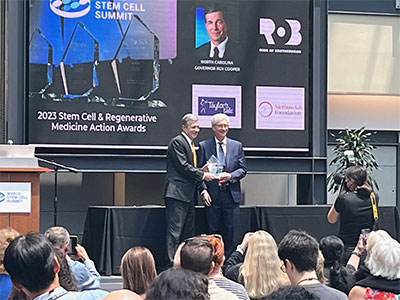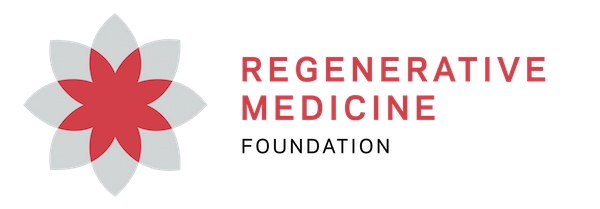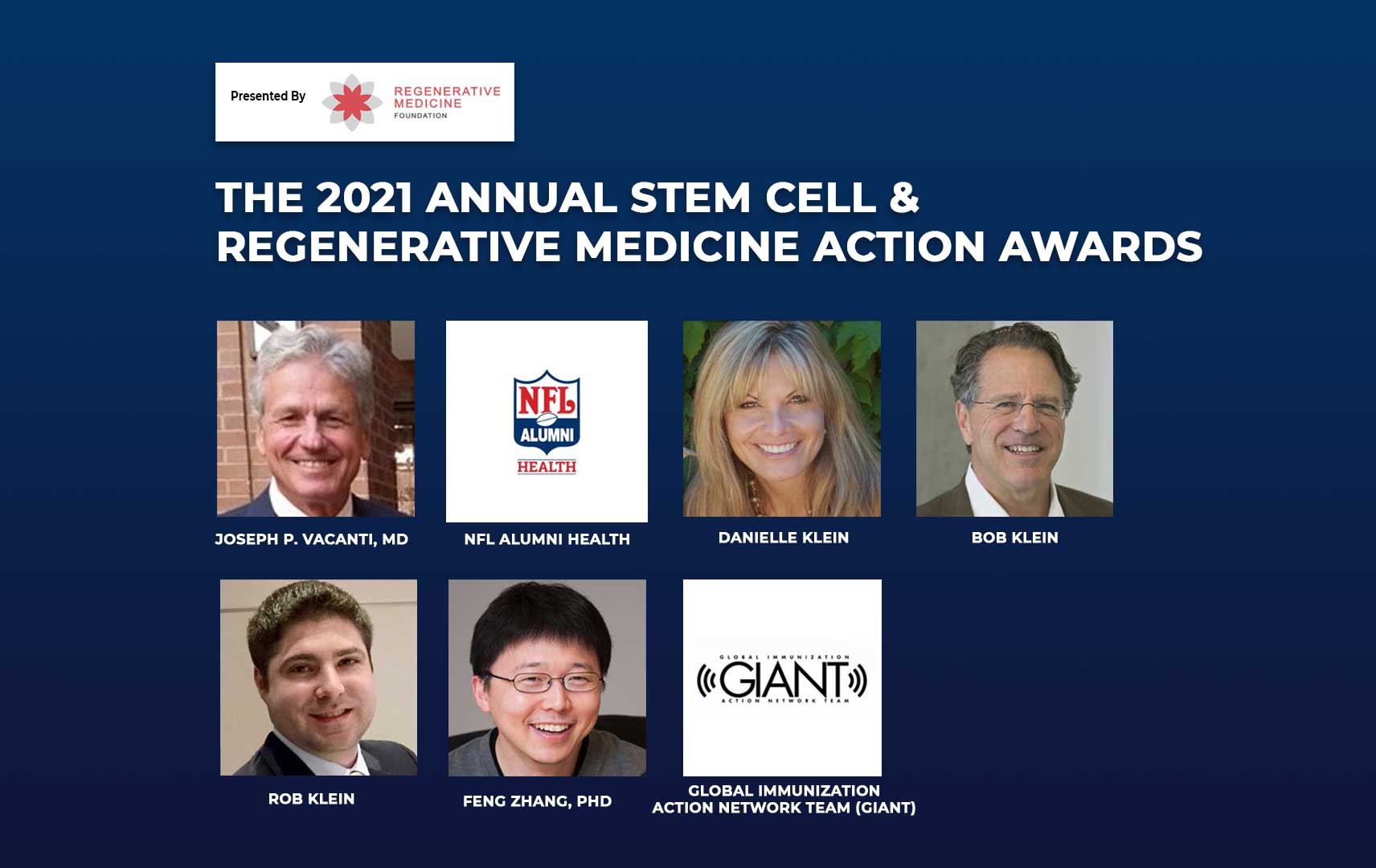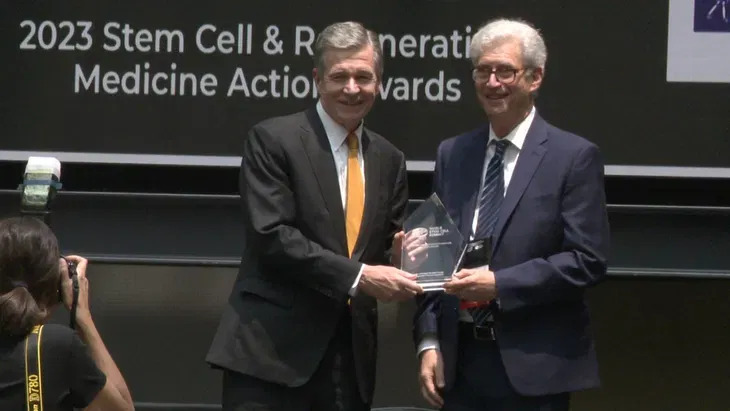By WRAL News
North Carolina Gov. Roy Cooper was recognized June 6 at the 20th annual World Stem Cell Summit in Winston-Salem for his role in developing the life sciences.
Cooper received the Regenerative Medicine Action Leadership Award from the Regenerative Medicine Foundation, a non-profit organization that promotes the development of regenerative medicine to improve health and deliver cures.
“Governor Cooper has spearheaded a number of strategic investments in North Carolina’s life sciences that promoted the development of the biotechnology workforce and has fostered a favorable environment for innovative biomedical research aimed at accelerating the development of effective treatments and cures,” said Bernard Siegel, executive director of the Regenerative Medicine Foundation and founder and co-chair of the World Stem Cell Summit.

“He serves as a national example of effective governmental leadership for the burgeoning field of regenerative medicine and technological innovation, as evidenced by everything that’s going on in Winston-Salem,” Siegel added. “North Carolina is recognized as a leading state for this new field of potentially curative medicine.”
After accepting the award at a luncheon ceremony, Cooper praised North Carolina as “the best place in the world” to do medical research, grow a workforce, establish a business and raise a family.
“What North Carolina is about is bold innovation and discovery that translates into a healthier state, a healthier nation and a healthier world,” he said. “From our vibrant and vast NCBIO organization that boasts 263 companies here in North Carolina, to our innovative NC Biotech Center, North Carolina is really ready to quite literally heal the world. The very fact that the World Stem Cell Summit is here in Winston-Salem is a testament to our state’s and this region’s commitment to the life sciences and making the world healthier.”
Nancy Johnston, executive director of the Biotech Center’s Piedmont Triad Region office, said Cooper’s award affirms the progress that North Carolina and the Triad have made in the life sciences and in the regenerative medicine sector.
“Our state’s leaders have made consistent public investments in life science research, biomanufacturing, business, education and workforce training over several decades, and those investments have brought major returns in innovation, company growth and high-paying jobs,” she said. “The Piedmont Triad region’s growing regenerative medicine community is one clear example of that.”
Other honorees at the Summit included:
- The Methuselah Foundation, which received the National Advocacy Award. The non-profit organization funds biomedical research and supports ventures focused on longevity science and extending the human healthspan.
- The Ring of Brotherhood Foundation, which received the Grassroots Advocacy Award. The non-profit organization provides services and advocacy for athletes who have suffered traumatic brain injuries, chronic traumatic encephalopathy and other life-altering sports-related injuries.
- Taylor’s Tale, which received the Inspiration Award. Based in Charlotte, the non-profit organization advocates for breakthrough treatments for rare diseases, which affect one in every 10 Americans and 350 million people worldwide.
WFIRM course held concurrently
The Summit was held alongside the 10th annual Regenerative Medicine Essentials (RME) summer course, a five-day event sponsored by the Wake Forest Institute for Regenerative Medicine (WFIRM).
WFIRM, part of the Wake Forest University School of Medicine, translates scientific discovery into clinical therapies. Its work includes research by about 400 scientists, physicians and technicians to engineer more than 40 different replacement tissues and organs, and to develop healing cell therapies. WFIRM is collaborating with researchers worldwide on about 400 research projects.
Cooper noted that WFIRM is “the largest regenerative medicine research facility under one roof in the world.”
WFIRM’s RME course is designed for clinicians, researchers, technicians, students, industry, investors, government representatives, patient advocates and organizations. It includes lectures, special presentations, interactive panels and networking.
The course has been supported over the years by Biotechnology Event Grants from the Biotech Center.
The course and the World Stem Cell Summit were held adjacent to one another in Winston-Salem’s Innovation Quarter, a downtown mixed-use district.
RegenMed Hub attracts companies
Winston-Salem’s growing regenerative medicine community, marketed as the RegenMed Hub, has become a major center for scientific research, technology development, education and workforce training in the field. It is led by WFIRM and the non-profit Regenerative Medicine Development Organization (ReMDO), a national organization that accelerates the discovery and translation of regenerative medicine therapies.
About 30 companies with an interest in regenerative medicine have a presence in the Innovation Quarter to access research, testing, incubation and workforce development infrastructure offered by WFIRM and ReMDO.
Overall, 97 life science companies and organizations working in all sectors of the life sciences have operations in Winston-Salem, according to the Biotech Center’s online company directory.
A growing market
Regenerative medicine is a developing field that seeks to heal or replace tissues or organs that have been damaged by disease, trauma, aging or defects. Tissue engineering, cellular therapies and medical devices are among the tools used.
The global market for regenerative medicine is expected to reach $180 billion by 2030, expanding at a compound annual growth rate of 15.7%, according to a report published in February by Grand View Research, a market research and consulting company based in San Francisco.
Driving that growth are an increase in demand for regenerative therapies for cancer and other diseases, especially among an aging population, and a rising number of clinical trials for stem cell and tissue-based regenerative therapies, according to the report.
(C) N.C. Biotech Center



